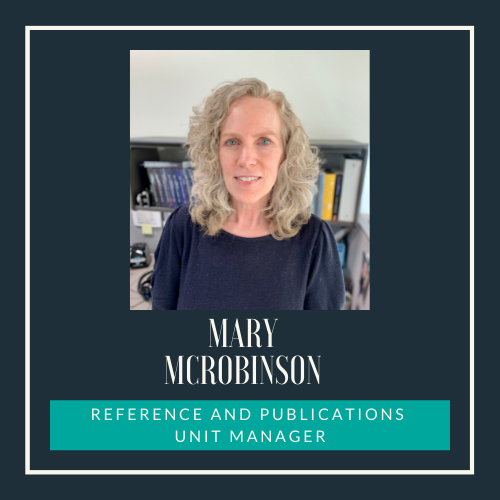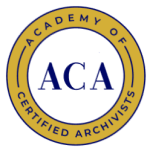Mary McRobinson, Candidate for Treasurer

Professional Experience:
Reference and Publications Unit Manager Oregon State Archives, 2019-present
University Archivist Willamette University, 2006-2019
Head of Arrangement and Description Richard B. Russell Library for Political Research and Studies at University of Georgia, 2001-2006
Processing Archivist Richard B. Russell Library for Political Research and Studies at University of Georgia, 2000-2001
Education:
- Master of Business Administration, Willamette University: 2019
- Master of Library and Information Science, University of Texas, Austin: 1999
- Bachelor of Arts in History, University of Nebraska, Omaha: 1995
Professional Activities:
- Academy of Certified Archivists, Member, 2006-present; Nominating Committee, 2019-2021.
- Northwest Archivists: Member, 2006-present; Past-President, 2018-2019; President, 2017-2018; Vice-President/President-Elect, 2016-2017; Treasurer, 2009-2013.
- Northwest Digital Archives: Chair of Interface and Usability Design Working Group, 2012-2013; Steering Team Member, 2007-2009.
- Oregon State Historical Records Advisory Board: Member, 2009-2015. Society of American Archivists: Congressional Papers Roundtable Steering Committee Member, 2006-2008.
“What is the role of archival certification in the modern work environment?"
Those of us in the profession are attune to working in environments where the past, the present, and the future intermingle. Societally we’ve been experiencing significant work place change these past two and half years, which could be characterized as modernization. The accompanying opportunity to examine long entrenched work norms is presenting itself for the archival profession as well. The ACA has been responsive in important and meaningful ways throughout the pandemic with the introduction of the online recertification portal and remote exam offerings as two examples.
Archival certification continues to fulfill important roles even as we’re modernizing. Certification demonstrates to employers that an individual possesses core knowledge and understanding of archival theory and best practices. The hiring entity can be confident the certified archivist is able to provide professional level results and thoughtful, ethical engagement. Certification can also be useful when advocating for fairer compensation and seeking promotions.
Certification offers flexibility for archivists to stay engaged and continue with education and professional development through recertification or periodic testing. This is a key advantage for individuals with competing demands and limited resources. Both options provide a useful framework for growth and can help generate support from employers. As the profession continues to question, challenge, and evolve the Academy of Certified Archivists encourages input and works to be thoughtful and responsive. There are opportunities to participate in exam development and certification maintenance and changes can be made more expediently than often happens at the curricular level in higher ed. These avenues for incorporating voices, perspectives, and feedback coupled with the responsiveness and national reach of the ACA are key advantages and position the ACA to play important roles as we modernize.
